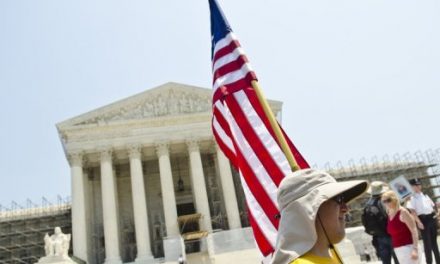JUDY WOODRUFF: Today, the city of Detroit and its creditors were presented with a series of painful options. Retired city workers were warned of significant cuts in pensions and health insurance, and creditors were told the city won’t be able to pay them back.
The day started with an announcement that the government already defaulted on some debt. It got worse from there.
Ray Suarez has the story.
PROTESTERS: Make the banks pay. Make the banks pay.
RAY SUAREZ: A handful of protesters picketed outside the Westin Hotel this morning, while, inside, Detroit’s emergency manager, Kevyn Orr, laid out a last-ditch plan to 150 creditors to accept pennies on the dollar in order to help keep the city running.
Orr told reporters afterwards that Detroit’s finances are beyond dire and that his plan to avoid filing bankruptcy “is going to be hard, it’s going to be difficult, but what choice do we have?”
During the meeting, Orr said the city would stop payments on its unsecured debt to bondholders, cut health care and pension benefits to current and retired city workers, give an independent authority control over the water and sewerage. The changes help tackle what Orr said was up to $20 billion dollars in debt and liabilities.
He was appointed three months ago by Michigan Gov. Rick Snyder to try to turn around Detroit’s finances and operations. But there’s been skepticism among some residents about the plans and about whether Detroit’s finances are as dire as Orr has said.
Abayomi Azikiwe protested the meeting this morning.
ABAYOMI AZIKIWE, Protester: We feel that the bankers and the creditors who are here today with the emergency manager are not going to negotiate in the best interest of the people of the city of Detroit. And we are saying that the same financial institutions that Mr. Orr is negotiating with today are responsible in large part for the crisis that exists in Detroit.
RAY SUAREZ: Once a booming Midwestern city, Detroit has suffered a big population loss and now ranks as the poorest major city in the U.S. More than a third of the population lives below the government poverty line.
We get more on the plan spelled out today and the reaction to all this from Matt Helms of The Detroit Free Press.
Matt, welcome.
From the beginning, Kevyn Orr didn’t sugarcoat the situation. But, even so, was something this extreme expected today?
MATT HELMS, The Detroit Free Press: Well, I think we’d been warned to expect something drastic, but that doesn’t — the warning certainly doesn’t prepare you for the scope and the risks involved here, and, you know, especially the cuts that, you know, the creditors, retirees, pensioners, city workers are going to be asked to take.
RAY SUAREZ: Who are the main holders of Detroit debt and who is it that’s being told to expect just pennies on the dollar?
MATT HELMS: It’s everyone.
It’s retirees. It’s pension plans. It’s the city’s unions and representing current workers. It’s bondholders, the insurance companies that backed those bonds. And bondholders can range from major institutional investors to, as one of the creditors told me today, mom and dad investing in a mutual fund.
RAY SUAREZ: How did Detroit get to be an estimated $17 billion to $20 billion dollars in debt? It’s had shrinking revenues for some time. It’s had very heavy legacy obligations for some time. Were there always institutions that were ready to line up and continue to lend the city money?
MATT HELMS: There certainly were. And they did up until last year, when the crisis hit.
And the last round of borrowing had to be backed by the state because Detroit’s credit rating had really just gone into trash territory. The state helped float $137 million dollars in bonds to help stabilize the city through what they hoped was going to be an agreement to keep it out of the appointment of an emergency manager.
That didn’t work. And here we are today perhaps just weeks away from a Chapter 9 municipal bankruptcy filing.
RAY SUAREZ: As we mentioned earlier, Kevyn Orr already announced that the city had defaulted on an obligation as of this morning. How much was it and to whom?
MATT HELMS: Well, it’s to a number of creditors, but it was a nearly $40 million dollar payment on a complex structure, a finance structure called participant — I’m sorry — a certificate of participation obligation.
And we know that the city has also kind of triggered terms for default in the past as well, but has been able to negotiate with creditors to extend payment dates. And, you know, there’s a long line of vendors, for example, who provide goods and services to the city who have gone months without payment.
RAY SUAREZ: Now, the emergency manager said the odds of a bankruptcy were 50-50. And, indeed, it would be the largest municipal bankruptcy ever. But why isn’t Detroit considered bankrupt already?
If it missed a payment today and is telling people that it owes money, that it’s only going to give them, in some estimates, 10 cents on the dollar, why isn’t it already considered bankrupt technically?
MATT HELMS: Well, I guess, technically, it already is bankrupt, but as a spokesman for the emergency manager told reporters today, there’s a difference between being bankrupt and being in bankruptcy. Bankruptcy is the process of resolving that debt.
And the — really, the difference between the two is whether you go to court to resolve it.
RAY SUAREZ: Today, the spokesman for Kevyn Orr mentioned that they would give the institutions involved a couple of weeks to digest the news that they got today. It must be terrible to hear, but are there some hard-and-fast dates, some deadlines that are looming in Detroit’s future that aren’t the kind of things that you can give people a couple of weeks to think about? What’s the next chapter in this drama?
MATT HELMS: Well, at best we can tell, if the negotiations don’t go well, we could know within a couple of weeks whether Kevyn Orr thinks that there is no option but — except for bankruptcy.
Beyond that, these talks, these negotiations with creditors could extend into July or August. And, you know, there are a lot of bankruptcy experts who say they doubt that an out-of-court settlement can be reached and that the best Kevyn Orr can hope for at this point is to get maybe 80 percent to 90 percent of the creditors lined up, so that when he goes in and files a Chapter 9 petition, he’s got a majority of the creditors lined up, and that can help persuade a federal judge to get the recalcitrant creditors on board with the deal, even cramming down, in the jargon, terms on creditors who are so far fighting the deal.
RAY SUAREZ: Have any of the creditors been heard from today, any of the institutions you mentioned earlier that might be expected to get a lot less money back from the city?
MATT HELMS: Many of them are not commenting. We have heard a lot of from the city unions today. They’re worried. They’re scared. Their members face pay and benefits cuts.
And there is even talk that vested pensions, which under Michigan law typically are protected from being cut once you are a retiree, that that may not be the case here in Detroit, and that Kevyn Orr and the city of Detroit may have to battle in court if necessary to reduce pension benefits for retirees who are already living on fixed incomes.
RAY SUAREZ: Matt Helms of The Detroit Free Press, thanks a lot for joining us.
MATT HELMS: Glad to be here.
Click to watch the interview








